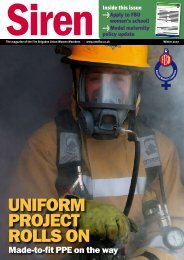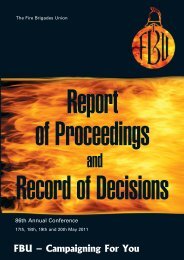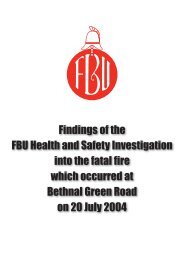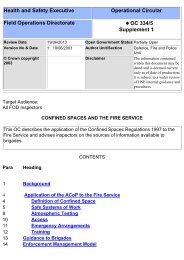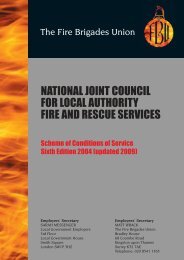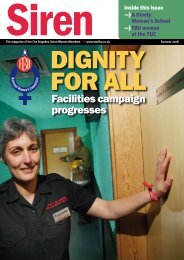Report - Fire Brigades Union
Report - Fire Brigades Union
Report - Fire Brigades Union
Create successful ePaper yourself
Turn your PDF publications into a flip-book with our unique Google optimized e-Paper software.
SECTION B — FIRE AND RESCUE SERVICE POLICY<br />
●<br />
●<br />
●<br />
●<br />
●<br />
providing assurance on interoperability at a level<br />
provided by the National Resilience Board for a full<br />
range of services;<br />
to have mechanisms in place to ensure<br />
interoperability across the United Kingdom;<br />
promoting community resilience;<br />
and developing further standards for the Multi-<br />
Agency Interoperability Work.<br />
This working group should include the wider sector and<br />
other government departments.<br />
6. PROTECTING THE NATION – MANAGING THREAT<br />
AND RISK<br />
How do we deal with national threats at the local level?<br />
Are we adequately prepared for major risks?<br />
A significant question that the group asked itself, is how<br />
are the linkages between National Threat and FRS risk<br />
planning created. Currently they are not sufficiently clear<br />
and the creation of a sector-led, and more effective<br />
mechanism needs to be put in place to ensure that there is<br />
more consistent planning in relation to national risks.<br />
The Coalition Government’s new National Security Strategy<br />
states that the Government’s response to national security<br />
must encompass two complementary strategic objectives:<br />
● ensuring a secure and resilient UK<br />
● shaping a stable world.<br />
The fire sector is an important contributor to the delivery of<br />
this National Security Strategy by addressing local risks,<br />
and making sure this contribution is integrated with other<br />
emergency services.<br />
It is clear that the Cabinet Office are very heavily engaged<br />
in work at the national level, but how this impacts locally is<br />
far from clear. There needs to be much closer working<br />
relationship between the sector as a whole and the<br />
Cabinet Office in identifying and responding to threats and<br />
risks. It is suggested that a revised IRMP Steering Group<br />
could ensure national benchmarking, share and<br />
disseminate best practice and provide a gateway for the<br />
oversight and coordination of proposals to mitigate the<br />
effects of national risks and threats – especially for cross<br />
border and cross partner arrangements. It would be<br />
essential to have a strategic presence from the Cabinet<br />
Office (CCS) on this Group.<br />
In undertaking this, it is envisaged that a national plan will<br />
be created by lifting the most relevant and critical elements<br />
of IRMPs, relating to national threats and risks and holding<br />
such information centrally. This will form a UK-wide plan<br />
that will be aligned closely to the National Resilience<br />
Planning Assumptions and LRF Guidance. Ensuring closer<br />
links to these critical national elements through local<br />
IRMPs will ensure a more robust national response to<br />
major events. The links between risk at every level and<br />
resulting resolution capabilities should be entirely<br />
transparent and demonstrable to the public. A common<br />
assessment protocol should be applied, and local IRMPs<br />
should provide local users of services with an assurance<br />
that those services are equipped to address the range of<br />
risks.<br />
There is a need to more closely integrate prevention,<br />
protection and intervention. Greater emphasis must also be<br />
given to risk in the built environment. IRMPs must be<br />
intelligence-based and led and have appropriate<br />
mechanisms capturing national risks through better links to<br />
the Civil Contingencies Secretariat and LRA Guidance.<br />
Local IRMPs must recognise national threats and<br />
consideration must be given to the links between Local<br />
Resilience Forums and IRMPs.<br />
In addition DCLG must be prepared to fully share the IRS<br />
data sets. The principle behind localism is to allow FRSs to<br />
measure what is important to them and allowing them<br />
access to the full data set would enable this and provide<br />
the ability to benchmark it as well. There is also the<br />
potential to allow public access to some of the data<br />
(subject to Data Protection issues) and so reduce the<br />
growing number of FOI requests received.<br />
Collectively, CFOA, the <strong>Fire</strong> Service College, CFRAU, as<br />
well as partners in the fire industry, might be able to<br />
provide a more effective lead in developing national<br />
operational doctrine, as well as other functions as part of a<br />
national hub.<br />
This would include the development of standard operating<br />
procedures for operational responses to risk, operational<br />
doctrine, mechanisms for ensuring command competence,<br />
other control measures, safe systems of work and the safe<br />
person concept and setting the requirements for<br />
operational training. From a central point, most<br />
appropriately at the College itself, this hub would be able to<br />
ensure national consistency across the whole sector –<br />
importantly it was also agreed that the Institution of <strong>Fire</strong><br />
Engineers (IFE) should provide the academic qualification<br />
and accreditation mechanism to support the role of the<br />
national hub and the wider training agenda.<br />
Vitally, the group recognised that an absence of a national<br />
methodology and template for assessing premises risk and<br />
7(2)(d) as a key risk. Such a model should be developed as<br />
a priority for any new national policy group created and<br />
should operate in a similar way to the model established<br />
for the Regulatory Reform Order (RRO). It is envisaged<br />
that the Civil Contingencies Secretariat will continue to set<br />
out guidance and map the relevant national threats, but by<br />
expanding the role of the FRS sector within a national<br />
IRMP Steering Group there should also be greater scope to<br />
ensure local plans capture critical and cross border issues,<br />
risks and ensure the effective tie-in of national risks to<br />
IRMPs.<br />
The issue of flooding has been raised by the Group. The<br />
Group recommends a resolution of the ambivalent situation<br />
FRS find themselves in with regard to flood and water rescue<br />
and urge the Minister to make these Statutory Duties,<br />
FBU Annual <strong>Report</strong> 2011 61





